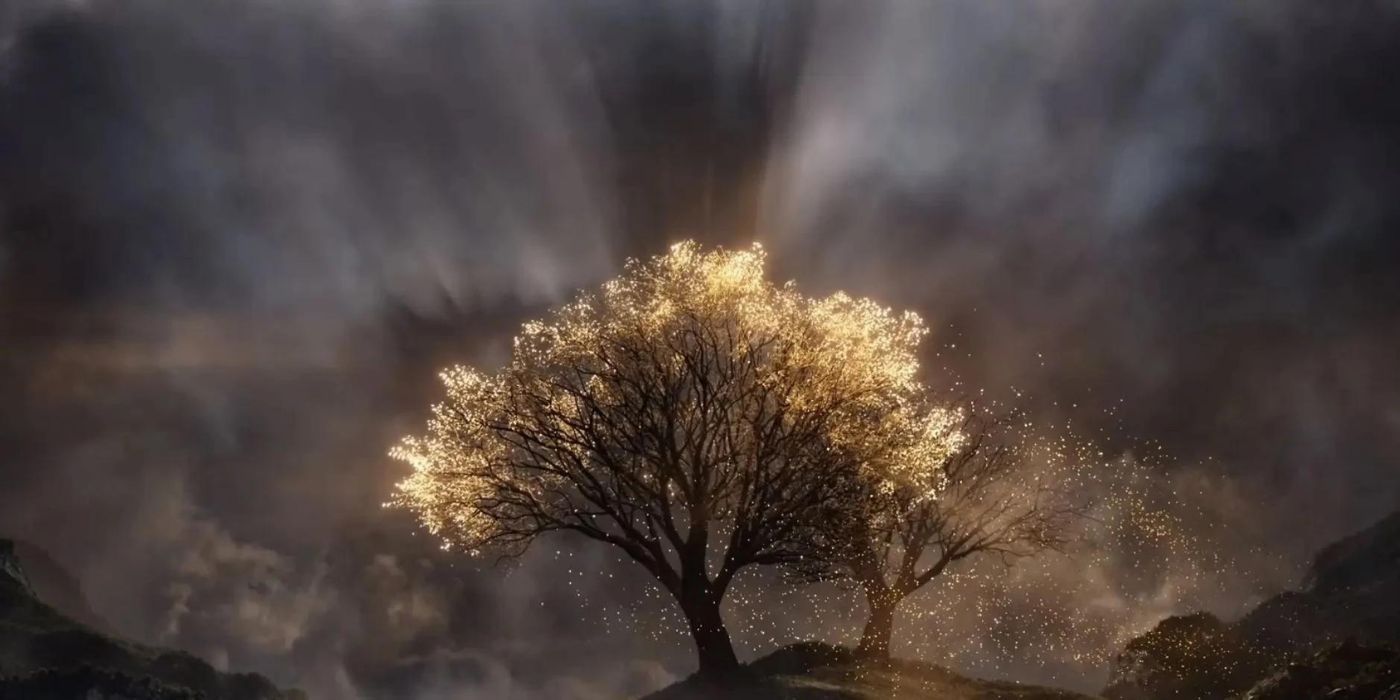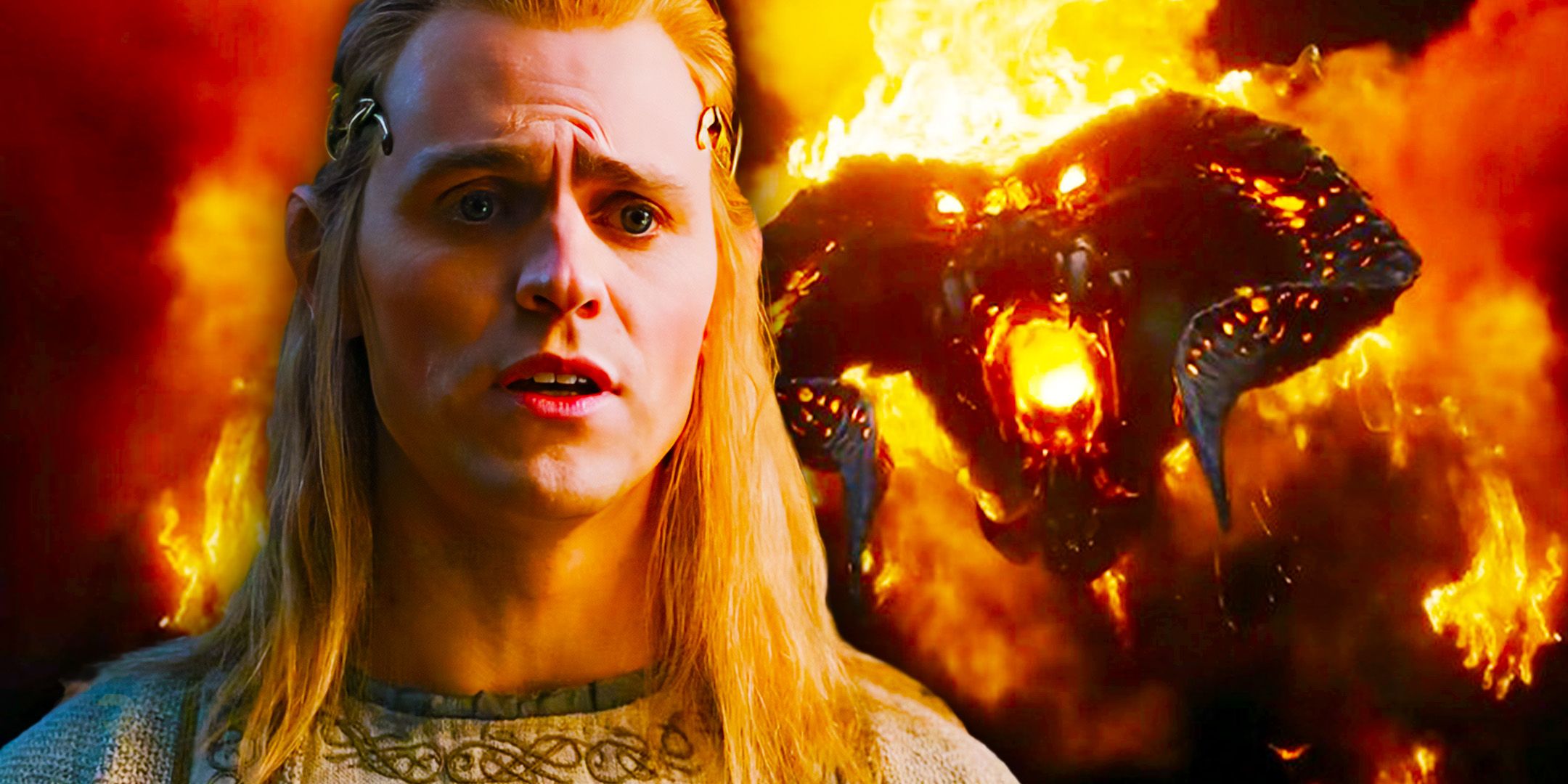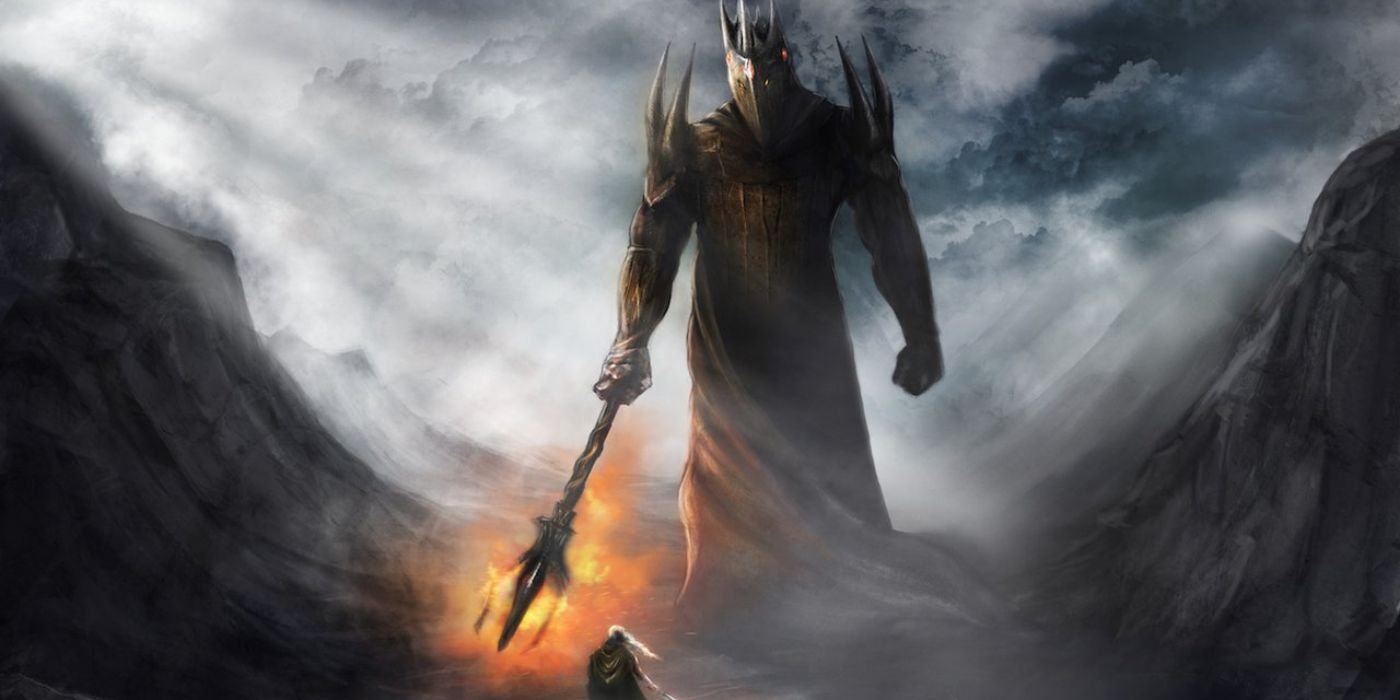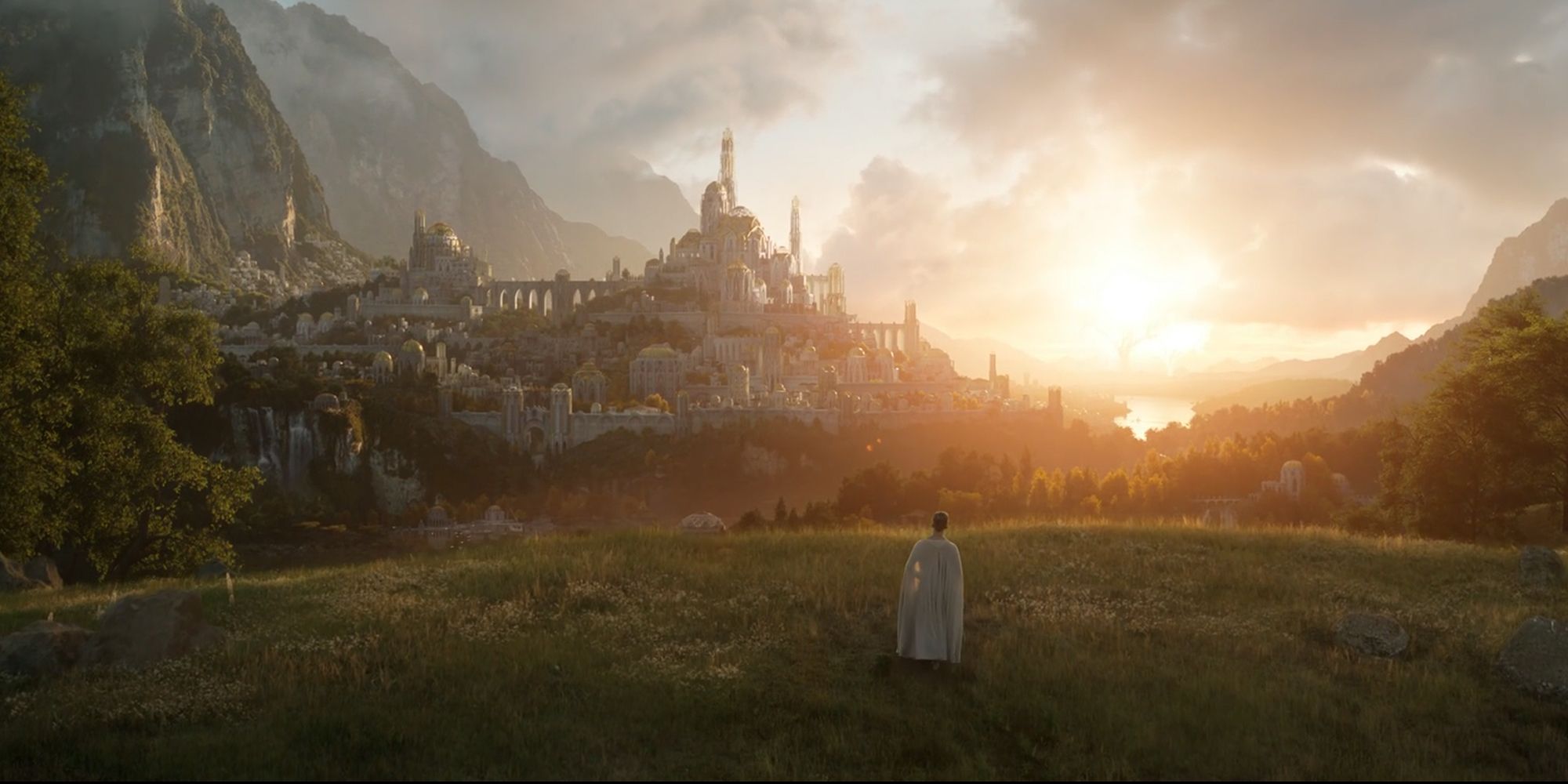The Lord of the Rings: The Rings of Power follows Sauron’s rise to power in the Second Age, but there have now been several mentions of his previous master, Morgoth. This original Dark Lord dominated Middle-earth long before the events of Prime Video’s Lord of the Rings series, and there are many ways that he was similar to his successor. However, Sauron is keen on pointing out all the ways that he is different in Rings of Power in an attempt to convince others (but mostly himself) that his rise to power and dominion in Middle-earth would end differently.
Morgoth was really the original bad guy of Middle-earth, and many of the evil goings-on in Lord of the Rings could, technically, be blamed on him. He established himself as the Dark Lord before there was a sun in the sky to count the years by and took part in destruction just for the fun of it. It was because of him that Elves were tormented into becoming Orcs, and for him that Sauron turned away from the god of Lord of the Rings, Eru Ilúvatar, and became Morgoth’s lieutenant. Then, when Morgoth was defeated, Sauron took his place—but he seemed determined not to be the same.
10 Morgoth & Sauron Had Different Visions For Middle-earth
Morgoth Was Obsessed With Destruction – Sauron Was Obsessed With Order
The primary difference that Sauron points out in Rings of Power is his vision for Middle-earth compared to Morgoth. His previous master was basically a nihilist. Morgoth despised the life and world that Eru Ilúvatar and the Valar had created and sought to destroy and corrupt it because of his own jealousy. He had been rejected the ability to create true life himself (since this is a skill belonging only to Ilúvatar through the Secret Fire) and therefore tried to make a mockery of all beauty and creation.
When his master fell, Sauron saw an opportunity to rebuild Middle-earth to his own design.
On the other hand, Sauron was less interested in destruction than he was in perfection. He valued order and felt his own power and talent was the best way to achieve it. Sauron was artistic and creative, capable of exceptional beauty, and desired a clean slate off of which he could build. Morgoth’s destructive ways were a means of achieving this. When his master fell, Sauron saw an opportunity to rebuild Middle-earth to his own design.
9 Morgoth Was A Higher-Ranking Member Of The Ainur
Morgoth Was A Vala – Sauron Was A Maia
When it comes to power, there is no question that Morgoth ranks ahead. Both Morgoth and Sauron were members of the Ainur, who Ilúvatar created at the beginning of all things to assist in the world’s creation. However, not all the Ainur were created equal. Morgoth, originally called Melkor, was the strongest of the Valar, massively powerful demigods who served directly under Ilúvatar.
Sauron, originally called Mairon, was one of the Maiar, angel-like beings who served under the Valar. The Maiar were still powerful, and Mairon was among their strongest, fairest, and most creative. However, this power didn’t compare to the Valar themselves. Had they wanted to, any of the Valar could have smote any of the Maiar at any moment. Of course, this wouldn’t have been Ilúvatar’s will.
Other Maiar included Gandalf, Saruman, Radagast, and the Blue Wizards.
8 Morgoth Became Evil Long Before Sauron
Morgoth Sewed Evil Into The World – Sauron Picked It Up Along The Way
Morgoth started to cause mischief pretty much immediately, back when he was called Melkor. During the Music of the Ainur, a song of creation essentially written by Ilúvatar for the Ainur to sing, Melkor took to singing his own dissonant chords. This threw the other Ainur off in their song, and the consequence of this was evil sewn into the world itself. From there, Melkor grew envious of Ilúvatar’s ability to create life and began searching the void for the Secret Fire so he could do it, too. Unable to find it, Melkor eventually came to Middle-earth and began twisting the Children of Ilúvatar and other living beings to his own design.
Sauron was a little slower to evil. He was considered trustworthy and faithful to the Valar for countless centuries while he served as the Maia to Aulë the Smith and learned his craft. He was praised for his artistry and mastered the skills of the forge to absolute perfection. His desire to learn and craft more is what ultimately led him to Melkor and down the path of evil.
7 Morgoth Commanded A Far Greater Army Than Sauron
Morgoth Commanded Balrogs & Dragons – Sauron Was Left With Orcs & Men
Throughout the second half of the Second Age, Sauron commanded a terrible army of Orcs, Uruk-hai, trolls, and more. His Rings of Power ultimately resulted in the ringwraiths, which often flew on the terrible fell beasts. Armies of evil Men eventually rose against the forces of good in Middle-earth, many of which worshiped Sauron as their Dark Lord. Still, none of this compared to Morgoth’s forces.
During Morgoth’s prime in the First Age, his armies certainly contained Orcs and Uruk-hai (which he had initially bred). There were trolls and various other nasty monsters as well. However, these were his weakest and most disposable forces. Morgoth’s armies often contained Balrogs and Dragons, the most terrible beings he had created by distorting and corrupting Ilúvatar’s creations. The wars that Morgoth fought, especially the battles against his fellow Valar, were so devastating that they changed the formation of Middle-earth itself.
6 Sauron Was More Keen On Shapeshifting Than Morgoth
Sauron Took Advantage Of His Shapeshifting Abilities
Sauron is known for his shapeshifting in the Lord of the Rings franchise, and this is seen in the first couple of seasons of Rings of Power. All Maiar can shapeshift, and after Mairon became Sauron (when he became Morgoth’s follower), he put his abilities to full use. In the First Age, he would, on occasion, transform into a wolf, vampire, and a serpent. Then, in the Second Age, Sauron took the beautiful elf form, Annatar, to deceive the smiths of Eregion and various other forms for similar purposes.
Morgoth certainly could shapeshift, but he didn’t have as much need or desire to. More often, this Dark Lord would change his size, with his most natural state seemingly being a mountainous form. Eventually, Morgoth lost his ability to change form—a fate that Sauron ultimately faced as well. However, this wasn’t as significant for the Vala as it was for his servant.
5 Morgoth Had No Need For Weapons Like Rings Of Power
Sauron Needed Complete Control To Achieve His Goals
Sauron’s Rings of Power were an effective way for him to achieve his goal. His vision for Middle-earth was a utopia in which everyone did precisely as he said, but this wasn’t a power that he naturally possessed (at least not to the extent he wanted). Through his One Ring, Sauron gained the ability to control all those who wore Rings of Power, which he so kindly handed out to rulers all around Middle-earth. Of course, this also doomed him since Sauron’s own power and essence were rooted in the One Ring, which is why he was able to be destroyed.
Through his One Ring, Sauron gained the ability to control all those who wore Rings of Power, which he so kindly handed out to rulers all around Middle-earth
Morgoth had no real need to control the beings of Middle-earth, so Rings of Power wouldn’t have interested him much. He dominated Middle-earth through power and strength, killing, corrupting, and destroying anything in his path. This also meant that Morgoth never needed to tether his power to any single object, so he didn’t have the same weakness as his Dark Lord successor. Instead, it was the Valar who ultimately took Morgoth down.
4 Sauron Was More Cunning & Seductive Than Morgoth
Morgoth Used Force – Sauron Preferred A Subtler Approach
Morgoth could certainly be convincing when he wanted to be. After starting a war with the Valar in the earliest days of Middle-earth, he convinced his brothers and sisters that he had changed his ways and lived in Valinor for several centuries before again betraying them. He also talked various beings (including Sauron) into being on his side. Still, Morgoth’s power didn’t depend on his cunning in the same way Sauron’s did.
As seen in The Rings of Power, Sauron’s being the “deceiver” was key in his rise to power. He didn’t need to be as naturally powerful as Morgoth because he had an unmatched talent for turning people to his side (even if they themselves didn’t know it). Sauron knew the hearts of Middle-earth’s beings and was aware of the desires that motivated Elves and Men. This talent for manipulation was forged right into the Rings of Power, allowing these weapons to turn a person’s greatest joys against them.
3 Morgoth Was More Covetous Than Sauron
Morgoth Was Motivated By His Own Jealousy
In a way, Morgoth was just a child who had been told “no” by their father. He had wanted nothing more than the ability to create life like Ilúvatar, but this skill was exclusive to the god of Lord of the Rings. Despite being the strongest of the Valar, Morgoth wanted more, and his rage at having this denied him was the primary motivation for all the horrible things he did thereafter.
Sauron was more like a gifted child who came to believe that only his talent could fix the world.
While Sauron could be compared to a spoiled child in some ways, he wasn’t nearly as covetous as Morgoth. The damage he did in Middle-earth wasn’t a fit meant to punish Ilúvatar and the Valar. Instead, Sauron more or less just wanted to prove that he could make Middle-earth perfect. He wanted balance and would go to any length to achieve it. Sauron was more like a gifted child who came to believe that only his talent could fix the world.
2 Sauron Was Never Directly Opposed By The Valar
The Valar Intervened When Morgoth Got Out Of Hand
When Morgoth first began picking on the Children of Ilúvatar by capturing Elves and tormenting them, the Valar decided that he was their own responsibility to destroy. This resulted in the War of the Powers, which ended when the Valar defeated Morgoth and brought him back to Valinor. Centuries later, Morgoth returned to Middle-earth after destroying the Two Trees of Valinor and stealing the Silmarils. After more devastating destruction, the Valar again intervened, fighting and defeating the Dark Lord and locking him away.
Sauron, on the other hand, was never directly stopped by the Valar. There was a certain order to things, and the Valar would not interfere with the damage done by one of their lessers. Instead, they sent other Maiar to Middle-earth (the Istari, or wizards) to guide the Elves, Men, and Dwarves against this new Dark Lord. However, the Istari were forbidden from directly fighting against Sauron themselves.
Gandalf was the only Istar who was successful in standing against Sauron without overstepping.
1 Sauron Meets A More Definitive End Than Morgoth
Morgoth Is Still Waiting For His Moment To Return
While Morgoth is gone from Middle-earth in The Rings of Power and The Lord of the Rings, he isn’t gone forever. This Dark Lord was locked away in the void by the Valar, where he remains imprisoned through Sauron’s rise to power and eventual destruction at the end of Frodo’s story. He is destined to eventually return. In an event called Dagor Dagorath, Morgoth will escape from his prison, and a final battle will be fought between the Valar. Still, Tolkien canon has no confirmation that this ever actually came to be.
Sauron faces a far more definitive end, however. Rings of Power is likely to end with his first big downfall when Isildur cuts the One Ring from his hand. Of course, The Lord of the Rings outlines how this Ring eventually falls into Frodo’s hands, and the Hobbit successfully (with Sam and Gollum’s help) tosses the thing in the fires of Mount Doom. As an immortal being, Sauron’s soul still exists after the Ring is destroyed. However, the fact that he had tethered all his power to the object means he can never again take form or have any influence. He’s about as gone as gone can be.



